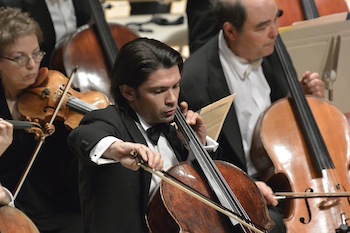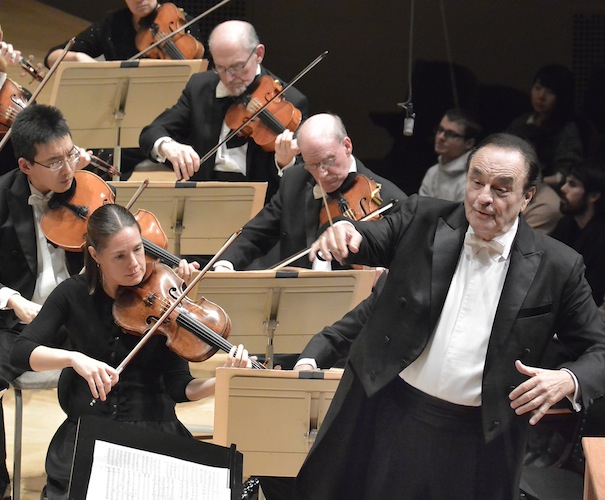Fuse Concert Review: Charles Dutoit conducts Ravel, Penderecki, and Elgar
Charles Dutoit, one of the Boston Symphony Orchestra’s favorite guest conductors, drew playing of high energy and vivid color.
Charles Dutoit conducts the Boston Symphony Orchestra in a program of Ravel, Penderecki, and Elgar at Symphony Hall, November 5.
By Jonathan Blumhofer
There were any number of ways to interpret the Boston Symphony Orchestra’s (BSO) subscription series program that began on Thursday, which paired Ravel’s Le Tombeau de Couperin and Krzysztof Penderecki’s Concerto Grosso no. 1 with Elgar’s Enigma Variations. One way might be to read the first half of the concert as showcasing ways in which the past meets the present, viewing archaic musical forms (particularly those of the Baroque era) through a modern or contemporary lens. Another approach would be to read the orchestra’s programming as a musical homage to friendship: in the present (the three cellists in dialogue in the Penderecki, the ingenious portraits of family and colleagues in the Elgar) and past (each movement of Ravel’s suite is dedicated to a friend killed in the Great War). Or, if you’re looking for more of a musical thread, the evening could be heard as a study of the shifting definition of tonality over little more than a century, from the late Romantic language of Elgar to the blues-tinged harmonies of Ravel to the rich chromaticism of Penderecki.
Whatever your preference, the program paid some remarkable musical dividends. Charles Dutoit, one of the BSO’s favorite guest conductors, drew playing of high energy and vivid color, a welcome change from last weekend’s mostly-monochrome reading of Das Lied von der Erde. That the orchestra loves playing for Dutoit was evident throughout the evening (I attended Saturday’s performance): the little turns in the opening of Le Tombeau had an extra bite and the sweeping, lyrical paragraphs of the Enigma Variations unfolded not just with inevitability but, also, with a kind of electric excitement.
At the heart of the concert was Penderecki’s 2001 score for three solo cellos and orchestra. In a career that now spans more than half a century, the soon-to-be 80-year old Penderecki (his birthday is November 23rd) has, at one time or another, been all things to all listeners: an enfant-terrible of the post-war avant-garde; a seemingly traditional conservative; and, finally, a mature master, whose musical toolbox encompasses common-practice-ish progressions and rigorous counterpoint alongside the experimental extended techniques and textural ideas that made Polymorphia and Threnody for the Victims of Hiroshima some of the most iconic music to come out of the 1960s.
Penderecki’s Concerto Grosso no. 1 hews fascinatingly to that latter style. Cast in six connected movements built around two fast sections, it’s a piece over which many shadows hover. Rich, mournful chorales brush up against angular chromatic motives and pungent harmonies. The cellists – this weekend the superb trio of Gautier Capuçon, Daniel Müller-Schott, and Arto Noras – exchange ruminations on related themes, sometimes argumentatively, sometimes soothingly. A recurring, searing melody breaks out from time to time, only to be subsumed either into the orchestra or in a cadenza among the soloists. Echoes of Shostakovich and Britten abound – especially when the piece turns martial – but there’s no mistaking its musical language for any composer except Penderecki.
In sum, it’s a gripping score, if, at 35 minutes, a little long for its content. Much of it draws surprisingly on conventional practices: Penderecki’s development of motives and use of certain forms (particularly marches and chorales) is decidedly rooted in the past. But these touchstones of familiarity are placed in a clearly modern context, juxtaposed with dense cluster chords and illuminated by a staggeringly brilliant orchestration (which, at one point, features a spectacular solo for marimba). The concerto’s dedicated to Dutoit and it’s safe to say that the glowing, haunting performance he drew from the BSO and soloists this weekend was as close to definitive as we’re likely to hear. Penderecki – who was in the house and received a tumultuous ovation at the end of the piece – certainly seemed to indicate as much, with hearty embraces for and salutes to the soloists, orchestra, and conductor.

Penderecki’s Concerto Grosso no. 1 is a gripping score in which cellists exchange ruminations on related themes. Photo: Stu Rosner
Equally brilliant on Saturday was Ravel’s homage to the French Baroque, Le Tombeau de Couperin. The BSO has long made a specialty of French repertoire and Dutoit is, perhaps, the finest Ravel conductor on the scene today. To judge from Saturday’s fleet reading, that combination may make this weekend’s Tombeau go down as one for the ages. Throughout, the BSO’s performance was light on its feet, Dutoit ably elucidating Ravel’s gossamer orchestration and bringing out the music’s several anticipations of jazz and the blues. The hero of this Tombeau was John Ferrillo, whose fluid account of the many oboe solos was nothing short of pristine, and for whom Dutoit ceded the podium for a well-deserved solo bow at the end of the piece.
Elgar’s Enigma Variations hasn’t been featured on a BSO program at Symphony Hall in, remarkably, fourteen years. It made a welcome return this weekend, receiving a strong reading.
This is one of the most personal pieces in the repertoire, a series of musical portraits of Elgar’s friends and loved ones that has quite justly earned its wide popularity. Saturday’s performance was steeped in nostalgia, humor, mystery, and triumph. Dutoit led a straightforward account that allowed the music speak for itself while also emphasizing Elgar’s brilliant orchestration. One might imagine a slightly weightier “Nimrod” – its first half felt a little rushed – but not by much, and the brilliant, fast variations (nos. 4, 7, and 11) were characterful, indeed. Principal viola Steven Ansell brought sweet charm to no. 6 (“Ysobel”) and organist James David Christie’s brief appearance in the final variation (“E.D.U.”) capped off the piece with a stirring, majestic touch.
This program repeats once more, on Tuesday evening. Next weekend, Dutoit closes his BSO residency with one of the 20th century’s milestone scores, Benjamin Britten’s War Requiem. This is a pairing of conductor and orchestra that does just about everything – from programming to playing – right. Don’t miss them.
Jonathan Blumhofer is a composer and violist who has been active in the greater Boston area since 2004. His music has received numerous awards and been performed by various ensembles, including the American Composers Orchestra, Kiev Philharmonic, Camerata Chicago, Xanthos Ensemble, and Juventas New Music Group. Since receiving his doctorate from Boston University in 2010, Jon has taught at Clark University, Worcester Polytechnic Institute, and online for the University of Phoenix, in addition to writing music criticism for the Worcester Telegram & Gazette.
Tagged: Boston Symphony Orchestra, Charles Dutoit

